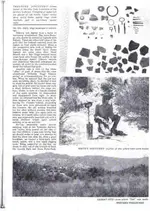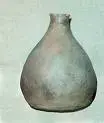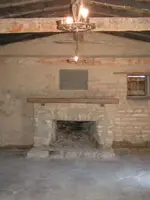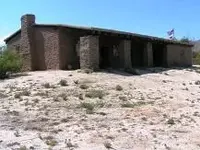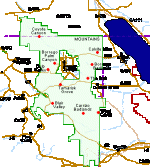"Spanish coins dating from 1665 to 1885"?? Is this just a legend, or is there there some written account of this? Sounds more like a coin collectors stashe, rather than a period stashe. Ie.: If that were an actual cache from, say ... 1885 (the newest dated coin), then it is unreasonable that there were coins over 200 years older than that in circulation at the time! I mean, when a person, even in antiquity, goes to bury a cache of then-current savings, it is unreasonable that coins much over 50 yrs. old would be in circulation. I have dug thousands of coins from sites dating from European CA's earliest toe-holds (mission era sites) to western era sites (1860s and newer). At no site is there ever coins older than about 50-ish years from the date of wherever we're hunting. Sure, now and then we get a reale worn SO thin that it is nothing but a round silver feature-less disk. But never coins that are 200 (or even 100) years older than the site we're hunting.
So if what you say is true, it appears that a coin collector lost or stashed that. I have heard of that happening. For example: a kid got in his dad's coin collection, and takes them to his school (built 1940s) for "show & tell". At lunch time, the 4th grade kid, a loner seeking popularity, proceeds to pass out the coins to other kids in the school yard. Choice shield nickels, silver dollars, bust halves, etc.... are passed out by the handful. Fast forward to later that year: A friend of mine is detecting thinking he's angling for recent silver (mercs, etc...) and is shocked to dig a fairly shallow bust half! A little further through the sandbox and he get a shield nickel! By the end of his hunt, he had several more coins like this. He tells a friend. The friend tries too, and also gets more choice key 1700s/1800s coins from this 1940s school yard. Word circulates out amongst these guys friends, and pretty soon, a total of a few dozen coins like this were eventually recovered. Wierd theories abounded: Like "there must have been an old house here before this school was built" or "they must've brought these coins in with fill-dirt at the time the school was blt. in the '40s" etc..
But then one day, a janitor was watching a fellow detect. He came over to him, and recounted how ... the year before, a kid had gotten in MAJOR trouble with his dad, for bringing his dad's collection to school, and loosing most of it. When the dad had wised up to what had happened, he had contacted the school, who in turn had asked the teacher to have all the other class kids give back whatever coins might still be in their possession. Obviously the dad got back only a portion of the original coins. Most had been fumble fingered lost over the previous days, by kids who had no idea they were anything but play money or whatever.
So the point is, it is possible that coin collections can also be stashed, or fumble-fingers lost. In the case of coins ranging in age of over 200 yrs., it has simply got to this scenario. As such then, it could be something stashed in modern times even, if you think of it.
As far as your first story, the $80k stolen by mexican bandits: that sounds like one of the many legends that starts off as camp-fire stories, and gets embellished into actual fact. Is there anything more than treasure mag. assertions? I mean, for example, if you talk to the average mexican immigrant where I'm at in CA, EVERY one of them has a treasure story from their home-town. They are just CERTAIN that every backyard or cave has caches, gold, silver, etc... When you ask them "how do you know?", then the suggestions of Pancho Villa, the conquistadors, the revolutions, etc... all come out. When you press them further for how THEY got his treasure lead, it becomes apparent that it is nothing more than fancied legends. Ie.: someone told someone who told someone who told someone, etc.... They just assume that anyone who acted strangely 50+ yrs. ago, "must've buried treasure". Or any sparkle coming the soil meant "gold is here!". We got so frustrated by these superstitions when we were down there, that we began to ask the well-intentioned persons (who were imploring us to "come with them to such & such ruins, cave, or whatever"), "what is the source of your treasure lead?". If they came back with anything like "The virgin Mary revealed it in a dream to my 10 yr. old" or "I saw a fire in the corner" or "someone told someone who told someone who told someone.... blah blah", we would politely decline. In each case like this they were deeply offended that we didn't believe them. To them, it was absolute fact. And if the detector gave no beep in the cave, it was simply that the detector didn't go deep enough. etc... It was almost comical.
But my point of all this is, that ........ maybe some cultures are more steeped in superstition than others, but mankind is basically alike. We are fascinated by tales of treasure, and want so deeply to believe. So before you know it, passing comments, or kernals of truth, are spun into "absolute factual tales". But when you study the actual data, it's always just stories, etc... Or to the extent there was an actual news account of the period that detailed a theft, we md'rs just *assume* it must be hidden nearby. I mean, that would be like going through each bank robbery nowadays from current news accounts, and just *assuming* that the bandit buried it in his back-yard, or near the bank, etc.... Heck, the bandits probably partied and spent it! But to close that loophole, each legend always ends with something like "the posse caught them and hung them on the spot", or "they were shot in a gun battle, and the $$ wasn't found on the deceased", etc... This makes the assumption that the posse was honest and didn't pocket it themselves. Who's to say they didn't report back to their superiors, "gee boss, the $$ was gone durnit. What'ya know!"
Treasure stories are a dime a dozen. Your best bet to find treasure is ditch the dime-store books, and merely take a 2-box unit out to any ruins and abandoned houses you come to. Dig all large signals, and pass anything smaller than a soda can (perfect job for a 2-box unit). If you do this around enough old ruins, you will eventually come up with stashed goodies.
I'm not saying all treasure lore is superstition guys, I'm just saying C'MON, let's all be realistic, and put the vast majority of them in the class of embellished lore, unless they have absolute historic proof. Not just "someone said" type stuff.



 ?
?